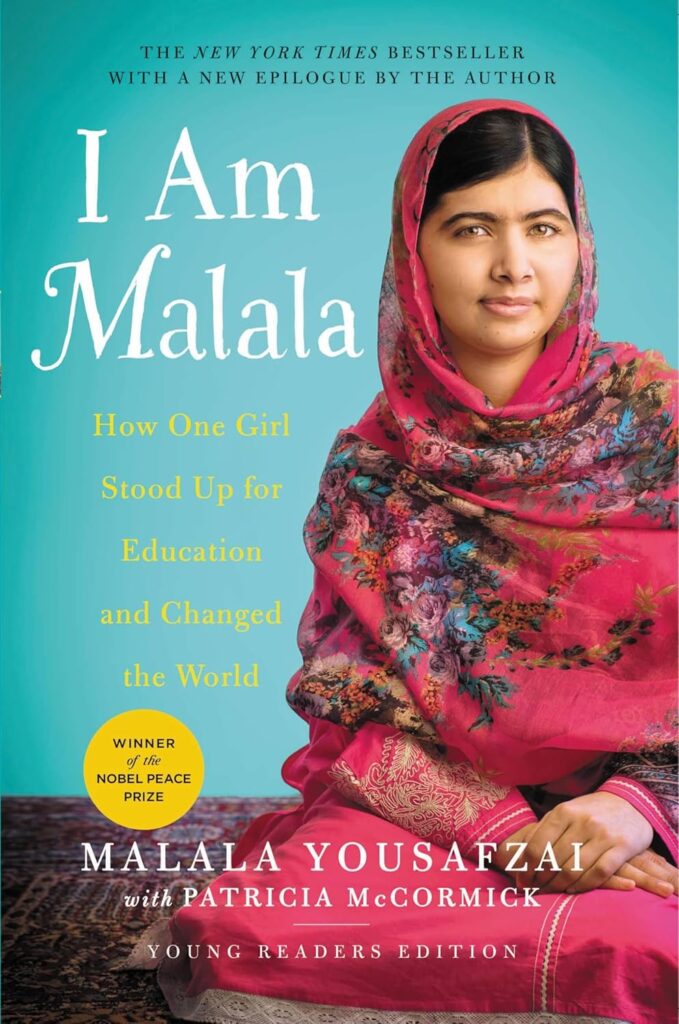The story of a girl who dared to raise her voice in a world where silence was expected—that’s what struck me the most about I Am Malala. The bravery, the determination, and the sheer will to fight for what she believed in, even in the face of danger, is what makes Malala Yousafzai’s story unforgettable. This is not just a tale of one girl’s struggle; it’s a beacon of hope for millions who are fighting for their right to education.
1. The Power of a Voice
From a young age, Malala knew the power of education. Growing up in the Swat Valley of Pakistan, where the Taliban was increasingly asserting control, she witnessed firsthand how girls were being forced out of schools. Yet, instead of being silenced, Malala found her voice. Her father, Ziauddin Yousafzai, was an educator who believed passionately in the right to education for all, and it was his influence that helped shape Malala’s courage.
When I first learned about Malala’s decision to blog for the BBC under a pseudonym, describing life under the Taliban’s rule, I was amazed by her bravery. She was just a child, yet she spoke out against one of the most dangerous organizations in the world. Imagine the courage it takes to do that. At an age when most kids are worried about homework or what game to play next, Malala was concerned about whether she and her classmates would even be able to continue their education.
But this courage wasn’t without its costs. Malala became a target. The Taliban, threatened by the power of her words and her growing influence, decided to silence her. On October 9, 2012, they attempted to do just that by shooting her in the head as she was returning home from school. That day could have been the end of Malala’s story, but it wasn’t. Instead, it marked the beginning of a global movement.

2. A Fight for Education
Reading about Malala’s recovery after the attack was nothing short of inspiring. The bullet had traveled through her head, neck, and shoulder, yet she survived against all odds. But Malala’s story isn’t just about her physical recovery; it’s about her unwavering spirit and her refusal to be silenced. I was deeply moved by her resilience. Even as she lay in a hospital bed, her thoughts were with the other girls in Pakistan who still didn’t have access to education.
What truly resonated with me is how Malala transformed her personal tragedy into a broader campaign for education. After recovering, she didn’t retreat into safety or let fear take hold. Instead, she stood up even taller, her voice louder than before. She began speaking out on international platforms, addressing the United Nations, and meeting with world leaders to advocate for the rights of girls to receive an education.
Malala’s story made me reflect on the privileges I often take for granted. I’ve always had access to education, yet here was a girl who was willing to risk everything for the chance to learn. It’s a powerful reminder of the value of education and how it’s something worth fighting for, no matter the odds.
3. The Global Impact
One of the most remarkable aspects of Malala’s journey is how her story has transcended borders and cultures. She has become a symbol of the fight for girls’ education worldwide. Her courage has sparked movements and inspired countless others to stand up for their rights. In 2014, she became the youngest-ever recipient of the Nobel Peace Prize, a recognition of her efforts to secure education for all children, particularly girls.
But what stands out to me isn’t just the accolades or the global recognition; it’s the fact that Malala remains humble and deeply committed to her cause. She’s not just a figurehead; she’s actively involved in promoting education through the Malala Fund, which she co-founded with her father. The fund works in regions where the barriers to education for girls are highest, continuing the work that Malala started in her homeland.
I found myself thinking about how one person’s determination can ignite change on a global scale. Malala’s story is proof that you don’t need to be in a position of power to make a difference. You just need to have the courage to stand up for what you believe in and the resilience to keep fighting, even when the world tries to silence you.
4. Lessons in Courage and Resilience
Malala’s story is not just about a girl who fought for her right to education; it’s about the courage to speak out when it’s easier to stay silent, the resilience to keep going when the odds are against you, and the belief that one person can make a difference. Her journey has taught me that no matter how young or small you might feel, your voice matters.
As I reflected on Malala’s experiences, I realized that her story is a call to action for all of us. Whether it’s standing up against injustice, advocating for what’s right, or simply valuing the opportunities we have, there’s something in Malala’s journey that speaks to everyone. It challenges us to think about what we’re willing to stand up for and what kind of impact we want to make in the world.
So, what will you stand up for? Malala’s story reminds us that the power to change the world lies in our hands, and sometimes, it only takes one voice to start a movement. Are you ready to raise yours?




